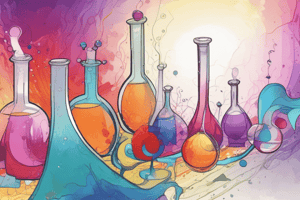Podcast
Questions and Answers
What is the primary difference between qualitative and quantitative analysis in analytical chemistry?
What is the primary difference between qualitative and quantitative analysis in analytical chemistry?
Qualitative analysis determines the presence of a substance, while quantitative analysis measures the amount of that substance.
Describe the main principle behind chromatography.
Describe the main principle behind chromatography.
Chromatography separates components of a mixture based on their interaction with a stationary phase.
What role does a mass spectrometer play in analytical chemistry?
What role does a mass spectrometer play in analytical chemistry?
A mass spectrometer identifies compounds based on their mass-to-charge ratio.
Explain the importance of sensitivity in analytical methods.
Explain the importance of sensitivity in analytical methods.
What are the common types of spectroscopy used in analytical chemistry?
What are the common types of spectroscopy used in analytical chemistry?
How does calibration enhance the reliability of analytical instruments?
How does calibration enhance the reliability of analytical instruments?
Identify the two techniques included under electrochemical analysis.
Identify the two techniques included under electrochemical analysis.
What are the applications of analytical chemistry in food safety testing?
What are the applications of analytical chemistry in food safety testing?
Why is proper documentation crucial in Good Laboratory Practices (GLP)?
Why is proper documentation crucial in Good Laboratory Practices (GLP)?
What distinguishes High-Performance Liquid Chromatography (HPLC) from Gas Chromatography (GC)?
What distinguishes High-Performance Liquid Chromatography (HPLC) from Gas Chromatography (GC)?
Flashcards are hidden until you start studying
Study Notes
Overview
- Analytical chemistry focuses on the qualitative and quantitative analysis of chemical substances.
Key Concepts
- Qualitative Analysis: Determining the presence of a substance.
- Quantitative Analysis: Measuring the amount of a substance.
Techniques
-
Spectroscopy
- Analyzes the interaction of light with matter.
- Common types: UV-Vis, IR, NMR, Mass Spectrometry.
-
Chromatography
- Separates components of a mixture based on interaction with a stationary phase.
- Types include HPLC (High-Performance Liquid Chromatography), GC (Gas Chromatography).
-
Titration
- Determines concentration of a substance in a solution through reaction with a titrant.
- Types: Acid-base, redox, complexometric.
-
Electrochemical Analysis
- Studies chemical properties through electrical signals.
- Techniques include potentiometry and voltammetry.
Instrumentation
- Mass Spectrometer: Identifies compounds based on mass-to-charge ratio.
- Spectrophotometer: Measures intensity of light at specific wavelengths.
- Chromatograph: Technique for separating mixtures.
Applications
- Quality control in pharmaceuticals.
- Environmental monitoring of pollutants.
- Food safety testing.
- Forensic analysis in crime scenes.
Important Terms
- Sensitivity: Ability to detect low concentrations.
- Selectivity: Ability to distinguish between different substances.
- Calibration: Process of determining the relationship between instrument response and analyte concentration.
Good Laboratory Practices (GLP)
- Ensure accuracy and reliability in analytical results.
- Include proper training, documentation, equipment maintenance, and quality control measures.
Analytical Chemistry Overview
- Focuses on identifying and measuring the amounts of chemicals.
- Qualitative analysis determines a substance's presence.
- Quantitative analysis measures a substance's amount.
Key Analytical Techniques
- Spectroscopy analyzes how light interacts with matter (UV-Vis, IR, NMR, Mass Spectrometry).
- Chromatography separates mixtures based on how components interact with a stationary phase (HPLC, GC).
- Titration measures a solution's concentration via reactions with a titrant (acid-base, redox, complexometric).
- Electrochemical analysis studies chemical properties using electrical signals (potentiometry, voltammetry).
Essential Instrumentation
- Mass spectrometer: Identifies compounds using mass-to-charge ratios.
- Spectrophotometer: Measures light intensity at specific wavelengths.
- Chromatograph: Separates mixtures into individual components.
Applications of Analytical Chemistry
- Pharmaceutical quality control.
- Environmental pollution monitoring.
- Food safety assessments.
- Forensic science investigations, including crime scene analysis.
Key Concepts in Analytical Measurements
- Sensitivity: The detection limit of low concentrations.
- Selectivity: The ability to distinguish between different compounds.
- Calibration: Establishing the link between instrument response and analyte quantity.
Good Laboratory Practices (GLP)
- Crucial for reliable and accurate analytical results.
- Involves proper training, detailed record-keeping, equipment maintenance, and robust quality control.
Studying That Suits You
Use AI to generate personalized quizzes and flashcards to suit your learning preferences.




